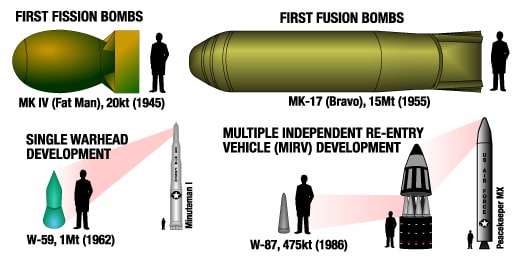If a country wanted to perform a nuclear first strike, launching a missile might be the wrong way to do it.
What if instead, the attacker smuggled the bomb in and remotely detonated it? A nuclear warhead can be as small as a trashcan[1], and they are undetectable outside a very close range[2] (10 meters without shielding). What could stop a capable attacker from smuggling a warhead into a Manhattan safehouse? What if one is there right now? How would we know? Nukes designed for smuggling have been proposed and developed.

What if this was done intentionally by treaty?
It seems crazy, but we already accept in principle that all nuclear powers are capable of destroying each other. Granting an adversary a small base in a major city(s) to stage a nuclear warhead doesn't change that. It would only formalize that capacity.
Intentionally making yourselves vulnerable to each other is actually a time-tested diplomatic tool. Today, a hostage exchange means we get our guys back and you get your guys back. In the past, it meant we give you some of our guys and you give us some of your guys. That way, each side has a reason not to attack the other. This was an integral part of diplomacy for much of human history.
Hypothetically, such an agreement could already exist and we wouldn't know. If our government negotiated a "bomb swap", it might be highly confidential. "Hey guys, I let China put a nuke in Manhattan" seems like a bad PR strategy. (I think the possibility these agreements already exist is very slim, but I have no concrete evidence.)
What could the advantages be?
Nuclear powers are entering a new arms race for the next generation of MAD. The development of highly capable missile defense systems and hypersonic missiles forces countries into a loop of developing ever better versions of these technologies[3]. In addition to being expensive[4], this also creates uncertainty[5]. "Could X missile be stopped by defense system Y?" Uncertainty in the context of MAD is a bad thing.
This dynamic also has the potential to be upended by Artificial Superintelligence, which could give one country an overwhelming advantage in both missile attack and defense[6]. It is easy to imagine this making nuclear powers who are left behind uncomfortable, even reckless.
A bomb swap could put MAD on a more solid and predictable footing as we enter a period of increasing unpredictability, and save everyone a lot of money.
What concerns are there?
Aside from it being politically toxic, there could be serious concerns around chain of command, terrorism, and accidental detonation. What would the exact mechanism be for triggering these bombs, and how could it go wrong?
Given these "nuclear embassies" would be within the adversary's territory, the potential to cut or jam signals to the controlling country exists. They would need to act like nuclear subs, capable of independent retaliation. This introduces concerns around unauthorized use, however the solutions that could be applied here would be no worse than those already applied in nuclear subs.
Assuming nuclear embassies are manned by humans, they would either be suicide missions or require a deep bunker for the operators to trigger the bomb from inside. This seems feasible. The Cheyenne Mountain Complex is built under 2000 feet of rock and designed to withstand a 30-megaton bomb within 1.2 miles (The largest nuke ever was 50-megatons[7]). This is a major facility, comprising 15 three-story buildings. A minimal bunker could be constructed at comparable or greater depths. Many mineshafts go far deeper[8]. Nor does the bomb need to be detonated directly there. Missile defense would not make a difference if the warhead is just being catapulted from one end of Manhattan to the other.
Perhaps the biggest concern is unintentional detonation. If a nuclear warhead unintentionally detonates in a submarine or a silo in a cornfield, the consequences would be small compared to a major city. There is also the diplomatic hazard. Such an incident might be interpreted as an attack, and start a full-scale nuclear war. Worryingly, our track record of unintentional detonation as a species, while technically spotless, is full of close calls. It is worth noting however that almost every incident is a result of a problem with the bomb delivery system, like an airplane crash or missile explosion. These systems would be comparatively inert, hopefully meaning less opportunity for things to go wrong. Still, the host country would probably require routine inspections and the highest safety standards enforced.
There is also a concern about the host country "rushing" nuclear embassies in the event of a war to disable them before they can be used. A natural response to this would be detonation. Therefore, a misinterpreted rush could present a significant danger. Strict protocols would be required for entering.
Finally, these bombs would be an attractive target for terrorists. As a result, these sites must be heavily guarded by the host country.
I am not endorsing this strategy.
There are probably many factors I have not considered, and the downsides may outweigh the upsides. It's also possible we don't want to preserve MAD, or we only want to preserve it with certain countries. (No reason to let North Korea make such a deal.) I still think this is an interesting, and to my knowledge, novel strategy for diplomacy.
- ^
https://en.m.wikipedia.org/wiki/W80_(nuclear_warhead)
- ^
https://scienceandglobalsecurity.org/archive/1990/01/detecting_nuclear_warheads.html#:~:text=In%20the%20absence%20of%20shielding,distance%20of%20tens%20of%20meters.
- ^
https://www.defense.gov/News/News-Stories/Article/article/3391322/general-says-countering-hypersonic-weapons-is-imperative/
- ^
https://www.cbo.gov/publication/58924#:~:text=about%20Mach%209.-,DoD's%20Current%20Hypersonic%20Missile%20Programs,programs%20to%20develop%20hypersonic%20missiles.
- ^
https://www.ucs.org/resources/how-does-missile-defense-work#:~:text=GMD%20vs%20Aegis%20vs%20Patriot%20vs%20THAAD&text=The%20process%20begins%20with%20infrared,system%20relies%20solely%20on%20collision).
- ^
https://situational-awareness.ai/the-free-world-must-prevail/
- ^
https://en.wikipedia.org/wiki/Tsar_Bomba
- ^
https://www.miningmagazine.com/management/news/1263149/deepest-shaft-us-complete
My understanding is that in the Cold War, a basic MAD assumption was that if anyone were going to launch a first strike, they'd try to do so with overwhelming force sufficient to prevent a second strike, hitting everything at once.